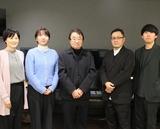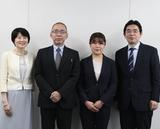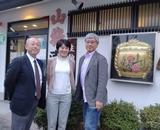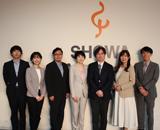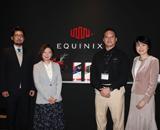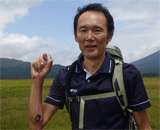September 2013
Striving to Become the No.1 Business School in Asia: Graduate School of Management, GLOBIS University
The expression "global human resources" has become commonplace in recent years. Today, not only corporations but also educational institutions, such as universities, promote the cultivation of global leaders.
In this issue, our guests are Tomoya Nakamura and Megumi Taoka of the Graduate School of Management, GLOBIS University. With the aim of becoming the No. 1 business school in Asia, GLOBIS University has been ahead of its peers in focusing on the development of global human resources since its opening in 1992. Last year, the university launched a full-time MBA program fully carried out in English.
We asked Mr. Nakamura and Ms. Taoka about the momentum building at GLOBIS--what do they have their sights set on at the current time?

From left to right: Nakamura, Ohsato, Taoka, Sato
- Profile
- Tomoya Nakamura: Dean, Graduate School of Management, GLOBIS University (English MBA Program)
Received a BA in Social Sciences from Hitotsubashi University and an MBA from Harvard Business School. Worked for Marubeni Corporation, and was involved in investment-related affairs in Advantage Partners' reorganization of Fuji Machinery Mfg. & Electronics Co. Ltd. after its bankruptcy. - Megumi Taoka: Manager, Faculty Content Office, Graduate School of Management, GLOBIS University (English MBA Program)
Received a BA in Philosophy at Keio University and an MBA from the University of Tsukuba Graduate School of Business Sciences. While in New York and London, was engaged in financial reporting for apparel and entertainment licensing businesses. - Mariko Ohsato: CEO & President, Arc Communications Inc.
- Yoshihiro Sato: Web Executive Manager, Arc Communications Inc.
A Full-Time MBA Program in English--The Objective Since Day 1
Ohsato: Last year, The Graduate School of Management, GLOBIS University established a full-time, all-English MBA program. I get the impression that you have made a full-scale launch of your globalization efforts. Can you tell us more about the ins and outs of this development?
Nakamura: We have always aimed to become the No. 1 business school in Asia. Ever since the school opened, we had felt that a program in English was required in order to achieve this aim. After all, offering classes only in Japanese limited our reach to the national market. We gradually expanded the range of the classes conducted in English, starting in 2006 with classes in English offered "à la carte," then progressing in 2009 to a part-time MBA program carried out in English on weeknights, and finally to the current full-time English MBA program in 2012. By launching the full-time English MBA program, we established cooperative relations with 36 large corporations and multi-national companies in relation to the nurturing of global human resources.
Ohsato: It seems to also have brought about a globalization of GLOBIS itself. I heard there are now a wide variety of students from different backgrounds and nationalities. Do you have in mind a target of students from any particular country?
Nakamura: The 23 students of Year One came from various countries, with a focus of students from Asian nations such as Indonesia, Malaysia, the Philippines and Thailand. American business schools teach about business in America only. We emphasize that taking MBA classes in Japan, an Asian nation, would prove more useful to those who are planning to play an active role in business that involves Japanese or Asian markets.
Taoka: When you go overseas, you realize how much trust and anticipation are directed towards Japan--much more than you may have imagined while in Japan. We have a very good reputation on many levels, such as being the best business school in Japan, having company executives from top Japanese firms as lecturers, having hospitable staff members, and providing swift support. Some were surprised to find actual lecturers coming to see them in person. After all, most schools only dispatch sales representatives. Japan is still a strong name abroad. Students are excited about having an opportunity to learn the secrets behind the success and high-ranking of Japanese companies on the global market. We strongly feel that there is an advantage to learning in Japan because not only management strategies but also cultural elements, such as the spirit of abiding by the rules, contribute to Japan's success.
Nakamura: Mr. Hori (Yoshito Hori, President of GLOBIS) also held seminars abroad for the recruitment of students. It seems to have helped students develop dreams about their future--that perhaps they may be able to become entrepreneurs like Mr. Hori if they study at GLOBIS.
Sato: From the students' point of view, studying in Japan itself is the crucial factor. Listening to them, we could clearly understand their desire to experience the power of successful Japanese companies firsthand. If you think from a sales perspective, you might think that it would be easier for us to get students if we opened schools abroad, but that isn't the case.
Nakamura: Exactly. When thinking about globalization, some people think that it would be more advantageous to open schools abroad, in Singapore for example. However, learning in a Japanese environment is a big part of the appeal for foreign students. Therefore, in our global educational services, we emphasize the advantages of studying in Japan. There is recognition that by studying in Japan, much can be learned outside of the classroom--things such as the Japanese spirit, the social contribution made through the business, and so on.
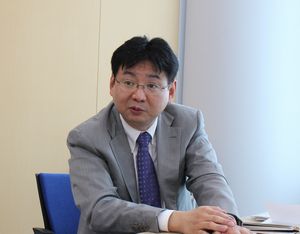
Taoka: We also want to emphasize how high women's aspirations are in Asia. At GLOBIS, 40% of the international students are women. This is quite a remarkable figure considering that in business schools, women usually account for only about 30% of the student body, even in Western business schools. In Japan, it is said that a high ratio of talented women find work at foreign-affiliated companies in Japan. We can expect an even greater increase in the number of women working in a global environment in the next ten or twenty years. In Thailand, we are told that women already account for 60% of managers. We would like to hold workshops abroad and actively recruit Asian women to our program.
Nakamura: Women are indeed tougher than people think.
Feature Interview Index

